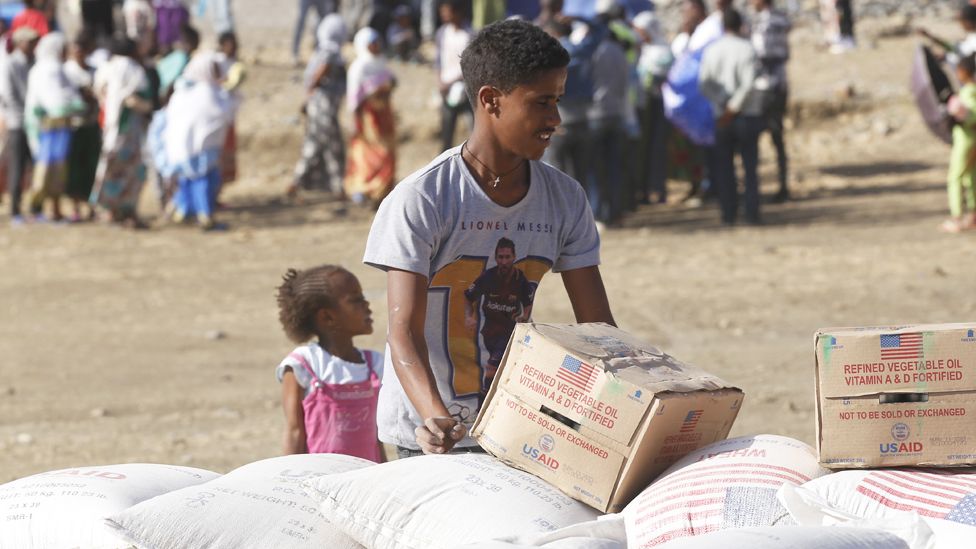At least 1,400 people have starved to death in Ethiopia’s northern Tigray since food aid was suspended because it was being stolen, an official has said.
The UN’s World Food Programme (WFP) and the US’s leading aid agency halted food aid to Tigray about four months ago.
A subsequent investigation by Tigrayan authorities found that almost 500 people were involved in the theft, the official told the BBC.
Tigray was hit by a brutal conflict in 2020, causing famine-like conditions.
The conflict ended last November after the Ethiopian government and the Tigray People’s Liberation Front (TPLF) signed a peace deal brokered by the African Union (AU).
Eritrean troops fought in the conflict on the side of the Ethiopian army.
For much of the war the region was under blockade, which largely halted humanitarian aid.
AU envoy, former Nigerian President Olusegun Obasanjo, said around 600,000 people died in the two-year conflict. Researchers put the hundreds of thousands of civilian deaths down to fighting, starvation and lack of health care.
- BBC Africa Live: Updates from the continent
WFP and USAid rallied to assist some six million Tigrayans, but announced a “pause” in food aid after discovering in April that their donations were being diverted to local markets. They did not say who was behind the diversion.
“We simply could not turn a blind eye to the criminal activity and continue to deliver,” a WFP spokesperson told the BBC this week.
The BBC has seen food with emblems of aid agencies such as the WFP and USAid on their packaging at markets in cities and towns in Tigray, including the capital, Mekelle.
However, it is unclear whether the food aid was corruptly “diverted” or whether it had been sold to market owners by aid recipients who were in desperate need of cash.
WFP and USAid also announced a suspension of food aid to the rest of Ethiopia in June.
USAid is the country’s largest food donor, helping millions of people struggling because of conflict, drought and the high cost of living.
A leaked memo by an independent donor group, quoted by several media outlets in June, said there had been a “co-ordinated and criminal scheme” apparently orchestrated by federal and regional government entities, with military units across the country benefiting.
Ethiopia’s government has said it is investigating the allegations, but its findings have not yet been released.
Ethiopia’s army has denied its troops benefited from any stolen food aid.
The Tigray interim government’s commissioner for disaster risk management, Gebrehiwet Gebrezgabher, told the BBC that food aid had been halted, 1,411 people had starved to death in three zones alone – the east, north-west and south-east, he said.
Data from Tigray’s other three zones had not yet been collated, and the death toll would prove to be much higher once this was done, Dr Gebrehiwet said.
He added that 492 suspects were under investigation, and 198 had so far been charged for their alleged involvement in the scam.
Among the suspects were government officials, staff of non-governmental organisations, co-ordinators at camps built for people displaced by conflict, and “partners who are distributors of the food aid”, Dr Gebrehiwet said.
“Business people, especially those who own food store and mills, are also involved,” he added, pointing out that their investigation had almost concluded.
In June, USAid said it would resume food aid only when it was “confident that assistance will reach the intended vulnerable populations”.
The WFP spokesperson said the agency was speeding up efforts to resume food aid. It had, in fact, started distributing a limited amount of food in some areas to test stringent new measures being put in place to “make sure food will not fall into the wrong hands again”.
“WFP is deeply concerned about the impact any pause in assistance may have on the lives of the families it assists. Therefore, we’re putting every practical safeguard in place to ensure food assistance reaches and is used by the intended beneficiaries,” the spokesperson added.
The BBC visited Shire, one of the biggest towns in Tigray, to see the effects of hunger.

An anaemic mother of three, Mebrhit Hailay, said she was now forced to beg because of a lack of food.
“Most days, we eat injera [a pancake-like fermented bread] with salt. The doctors advise me to have a balanced diet, but from where do I get it?” the 28-year-old said.
Her two children, aged five and two-and-a-half years, looked thin, their eyes sunken and their bony limbs stuck out from their clothes.
If lucky, they ate one meal a day, but on other days they went to bed hungry, Ms Mebrhit said.
Ms Mebrhit was heavily pregnant when the BBC met her. A few days later, she told the BBC she had given birth to a baby girl who, fortunately, was healthy.
At the local hospital, nurse Kibra Mebrahtu said that many mothers could not breastfeed because of hunger, and “many children are near death when they are brought to this hospital”.
“We lost four this month only. The effects of the conflict, lack of food, lack of transport, are quite evident,” she said.

The BBC saw eight-year-old Rahel Tewelde, with ribs exposed, at the hospital. She weighed only 10kg (22lb), the weight of an average one-year-old.
Her mother, Hiwet Lebasi, said she believed that corruption led to the suspension of food aid.
“Had it been distributed properly, it wouldn’t have stopped,” she said.
Related Topics
- Ethiopia
Around the BBC
-
Focus on Africa podcasts
